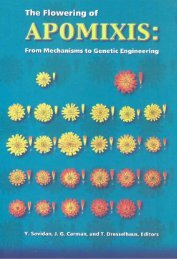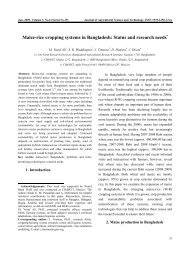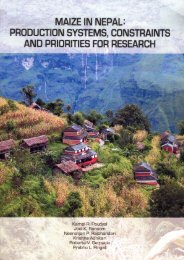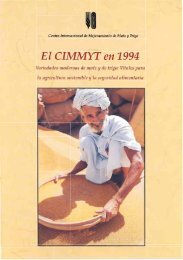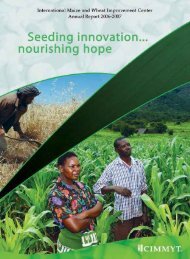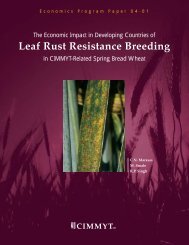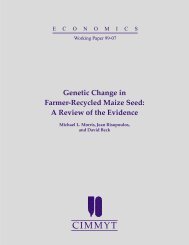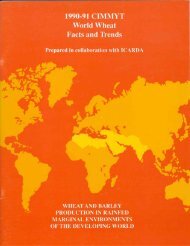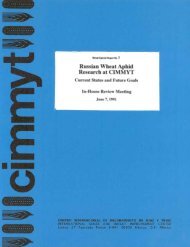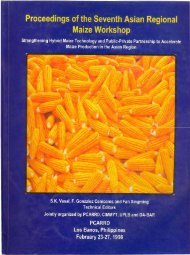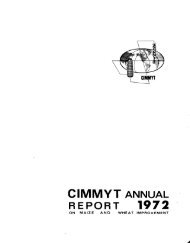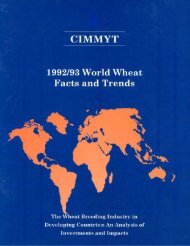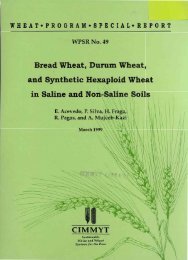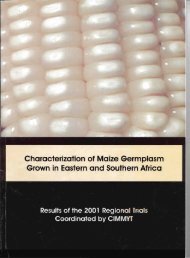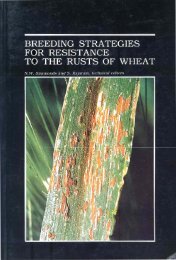Proceedings of the Fifth Asian Regional Maize Workshop - Search ...
Proceedings of the Fifth Asian Regional Maize Workshop - Search ...
Proceedings of the Fifth Asian Regional Maize Workshop - Search ...
Create successful ePaper yourself
Turn your PDF publications into a flip-book with our unique Google optimized e-Paper software.
The proposed Directive also addresses <strong>the</strong> relationship between <strong>the</strong> patent system and <strong>the</strong><br />
PVR system through a compulsory 1icensing system. Any PVR holder is granted <strong>the</strong> right to a<br />
patent license if his variety infringes <strong>the</strong> patent and if <strong>the</strong> license would be considered to be<br />
in <strong>the</strong> public interest. Similarly a compulsory license on <strong>the</strong> PVR to <strong>the</strong> patentee is also<br />
provided for. compulsory licensing has been seriously objected to by industry.<br />
The proposed Directive contains an amendment which provides farmers <strong>the</strong> right to multiply<br />
and propagate on <strong>the</strong>ir own farms seeds obtained from crops cultivated on <strong>the</strong>ir farms which<br />
<strong>the</strong>mselves were grown using seeds protected by patent. This amendment was introduced on demand<br />
<strong>of</strong> <strong>the</strong> European Parliament but is strongly opposed by industry.<br />
The emergence <strong>of</strong> patent rights in <strong>the</strong> agricultural domain, as a result <strong>of</strong> biotechnology,<br />
has been generally perceived as an intrusion on <strong>the</strong> existing PVR system, and was initially<br />
rejected in agriculture circles. These and o<strong>the</strong>r developments led to an initiative to revise <strong>the</strong><br />
UPOV Convention. The UPOV convention, a multinational treaty for <strong>the</strong> protection <strong>of</strong> plant<br />
varieties, has been ratified by most industrial countries. In Europe, a proposal to introduce<br />
Eureopean Community Plant Variety Rights has also come up for discussion.<br />
The UPOV Convention was substantially revised in March 1991 in order to streng<strong>the</strong>n <strong>the</strong><br />
rights <strong>of</strong> breeders. The revised text has not yet been ratified by <strong>the</strong> national parliaments <strong>of</strong><br />
<strong>the</strong> UPOV member states. An important provision <strong>of</strong> <strong>the</strong> revised text is <strong>the</strong> extension <strong>of</strong> <strong>the</strong> scope<br />
<strong>of</strong> <strong>the</strong> PVR to essentia17y derived varieties. These are defined as varieties that are derived<br />
from a protected source variety, and which while clearly distinguishable <strong>the</strong>refrom, never<strong>the</strong>less<br />
retain all <strong>the</strong> essential characteristics <strong>of</strong> <strong>the</strong> source variety. This is aimed at safeguarding<br />
<strong>the</strong> original breeder's efforts in obtaining a specific combination <strong>of</strong> desirable characteristics<br />
in a plant variety against <strong>the</strong> simple introduction into his variety <strong>of</strong> a distinguishing characteristic<br />
ei<strong>the</strong>r by means <strong>of</strong> mutation, repeated backcrossing, gene insertion or o<strong>the</strong>rwise, without<br />
changing <strong>the</strong> overall genetic composition <strong>of</strong> <strong>the</strong> variety. The new variety will be dependent on<br />
<strong>the</strong> original variety and cannot be sold without <strong>the</strong> permission <strong>of</strong> <strong>the</strong> original breeder. How <strong>the</strong><br />
principle <strong>of</strong> essentially derived varieties will be applied in practice still needs to be determined.<br />
The scope <strong>of</strong> protection in <strong>the</strong> revised UPOV convention extends not only to <strong>the</strong> propagating<br />
material, but also to harvested material and products directly obtained from <strong>the</strong> harvested<br />
material. With respect to <strong>the</strong> farmer's priVilege, a provision was introduced which stipulates<br />
that each contracting state may impose restrictions in <strong>the</strong> PVR pertaining to farmer's privilege<br />
as per its own requi rements.<br />
The seed industry in developed countries is seeking harmonization <strong>of</strong> PVR and patent<br />
legislation. In o<strong>the</strong>r words, a uniform and consistent interpretation <strong>of</strong> existing PVR and patent<br />
laws is being sought to ensure optimal protection <strong>of</strong> plant varieties and biotechnological<br />
inventions and to foster <strong>the</strong> overall innovatory potential and competitiveness <strong>of</strong> <strong>the</strong> seed<br />
industry. The seed industry expects to benefit from <strong>the</strong> proposed amendments to IPR.<br />
A detai led comparison <strong>of</strong> European and American Patent and PVR laws, and <strong>the</strong> proposed<br />
amendments to <strong>the</strong>se laws currently being sought, is given <strong>the</strong> Table 6.<br />
Developing countries<br />
-rhe enactment <strong>of</strong> strong PVR and patent legislation, similar to that in <strong>the</strong> industrialized<br />
countries, is probably not appropriate for <strong>the</strong> developing countries, at least in <strong>the</strong> short term.<br />
Any legislation, if enacted, must take into consideration <strong>the</strong> following:<br />
Because <strong>of</strong> <strong>the</strong> bUdgetary constraints at both NARS and lARes, it is important that<br />
private sector research in plant breeding is encouraged. Unless <strong>the</strong>re is a<br />
mechanism to protect value through some IPR mechanism, such as PVR, it will be<br />
difficult to entice <strong>the</strong> private sector into varietal breeding, seed production,<br />
and distribution. The timing may not be right, bUt eventually if private breeding<br />
is to take-<strong>of</strong>f and flourish, some mechanism to provide breeder's rights will have<br />
to be created.<br />
New technologies, such as biotechnology, are patent driven. Because <strong>of</strong> <strong>the</strong> high<br />
costs associated with <strong>the</strong>ir development, it is important that a mechanism is<br />
created to protect biotechnological inventions so as to encourage private sector<br />
231



